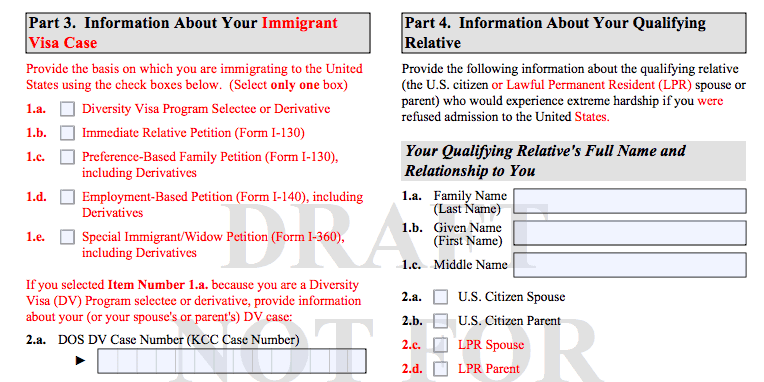Good news! Different categories of immigrants and family members of permanent residents will be eligible to apply for a provisional waiver of the "punishment law" within the United States in a few weeks.
This is one of the benefits of the proposal to modify the requirements to apply for a provisional pardon to the "punishment law" that was presented in July 2015.
After evaluating the modifications and public comments, the U.S. Department of Homeland Security (DHS) will soon publish the final rule which approves the proposal that expands who is eligible.
DHS is currently finalizing the process for the changes to be implemented. It is estimated that the provisional waiver modifications to the "punishment law" will go into effect at the end of June 2016.

The "penalty law" penalizes certain undocumented immigrants for living in the United States illegally, and depending on how long they have been in the country, prohibits them from returning for 3 or 10 years.
A "law of punishment" waiver may be requested either inside or outside the United States. When the waiver is requested within the United States, the application is called a "provisional waiver of the law of punishment.
To date, only undocumented immediate family members (spouses, parents and unmarried children under the age of 21) of U.S. citizens may apply for a provisional waiver of the "penalty law" within the United States.
To be approved for a waiver, the immigrant must show that it would cause extreme hardship to his or her U.S. citizen spouse or parent if permanent residency is denied.
All other immigrants have to travel and apply for the pardon outside the country, running the risk of not being able to return if they were denied. But this will change once modifications to the requirements for applying for provisional pardon to the punishment law go into effect.
The advantage of applying for a provisional waiver within the United States is that the immigrant knows in advance whether the case will be approved. Upon receiving approval of the provisional waiver of the punishment law, they can leave the country to apply for an immigrant visa at the U.S. consulate in their home country and return to the U.S. when the visa is granted.
Who will benefit from the expansion of the provisional pardon to the law of punishment?
The new terms will allow any eligible alien to apply for provisional waiver of the penalty law, including:
Individuals selected by the Diversity Visa Program (visa lottery), including derivatives.
2. Petition for Immediate Relatives of U.S. citizens (spouses, parents, and unmarried children under 21 years of age).
3. Petition for Family Preference, including derivatives. The types of family preference are as follows:
* First preference: unmarried children of U.S. citizens over 21 years of age.
* Second preference A: Spouses of permanent residents and unmarried children, under 21 years of age, of permanent residents of the United States.
* Second preference B: unmarried children, over 21 years of age, of permanent residents of the United States.
* Third preference: married children of U.S. citizens, their spouses and unmarried children under 21 years of age.
* Fourth preference: siblings of U.S. citizens, their spouses and unmarried children under 21 years of age.
4. Immigrant Alien Worker Petitions, including derivatives. The types of employment preference are as follows:
* First preference (EB-1): priority workers.
* Second preference (EB-2): professionals with advanced degrees and persons of exceptional ability.
* Third preference (EB-3): skilled workers, professionals and unskilled workers.
* Fourth preference (EB-4): certain special immigrants.
* Fifth preference (EB-5): immigrant investors.
5. Widow(er) or Special Immigrant, including derivatives.
The changes would also extend the provisional waiver to the penalty law to eligible aliens applying for immigrant visas if they can demonstrate that it would cause extreme hardship to their spouse or parents who are permanent residents from the United States if you are denied permanent residency.

Warning
As the proposal is not yet effective, please, do not send no application requesting a provisional waiver of the punishment law under the new criteria proposed by DHS.
Also, remember that any applicant for a provisional pardon to the law of punishment cannot have committed any other offense that would make him/her inadmissible to immigrate to the United States.
Please share this information and consult with an immigration attorney before beginning the process for permanent residency to be sure you meet all the requirements.
